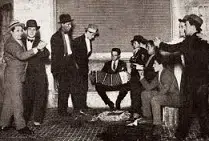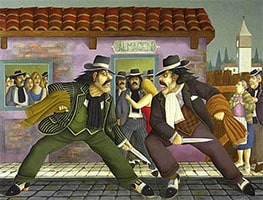 Lunfardo is a slang that emerged among lower class people in the City of Buenos Aires and its surroundings at the end of the 19th century and the beginning of the 20th century . Over the years, numerous words and expressions from lunfardo were incorporated into the colloquial speech of Argentina and Uruguay .
Lunfardo is a slang that emerged among lower class people in the City of Buenos Aires and its surroundings at the end of the 19th century and the beginning of the 20th century . Over the years, numerous words and expressions from lunfardo were incorporated into the colloquial speech of Argentina and Uruguay .
The massive arrival of European immigrants to Buenos Aires , especially Spanish and Italian, led to the advance of lunfardo, which in its beginnings also broke out in Rosario and the Uruguayan city of Montevideo . At first it was a language used by criminals and then it spread among the lower class sectors, even forming part of literary works of various genres, such as poetry and, of course, song lyrics. Finally lunfardo reached all social strata.
Both Buenos Aires, Rosario and Montevideo were at a very similar moment from a sociocultural point of view, largely due to their port activity and the considerable volume of immigration from various parts of Europe that took place at the end of the 19th century and beginning of the 20th
This influx of people from different European countries was concentrated above all in the Río de la Plata , where the economy also grew, especially for Argentina and Uruguay.
Tango , in this framework, played an important role in the expansion of lunfardo. Many of the most popular songs in the genre include slang terms and phrases that became popular and added to conventional language.
In the development of lunfardo, the mixture of languages known as cocoliche is combined; the alteration of syllables to form new words; and gaucho speech , for example. Terms from aboriginal languages such as Guaraní and Quechua are also incorporated.
Let's look at an example of lunfardo: “This cool guy never worked: he always had a great time bringing together girls with a lot of money.” In the phrase we can find words like “bacán” (someone wealthy), “laburó” (worked), “engrupiendo” (cheating), “minas” (women) and “guita” (money).
“You are a tormentor! "How are you going to work a rubber band's pussies?" , meanwhile, is an expression with lunfardo terms such as “torrante” (shameless), “afanar” (steal), “puchos” (cigarettes) and “gomía” (friend).
The Argentine writer and essayist Mario Edigio Teruggi points out that lunfardo is made up of terms and expressions that do not appear in normal Spanish dictionaries since they are part of a "substandard" speech that should not be mixed with educated speech.
 Today, many decades after the birth and rise of tango, lunfardo is still present in society, more present in certain regions than in others, easier to detect in certain strata than in others, but it is still there.
Today, many decades after the birth and rise of tango, lunfardo is still present in society, more present in certain regions than in others, easier to detect in certain strata than in others, but it is still there.
Beyond the inheritance of foreign terms, we must not forget that the Spanish of Argentina and Uruguay differs greatly from that spoken in Spain, given the cultural mix that occurred after the Conquest. This has always drawn a dividing line and it is partly thanks to lunfardo that in these countries speech was able to find its own identity .
Argentina has always been a country with a great cultural and racial variety. Lunfardo is one of the ways in which this fusion is manifested: like its other features, this set of words was born from the arrival of new cultures and was consolidated when it accepted them as essential parts of its structure .
In 1878 the newspaper La Prensa published an article entitled "The dialect of thieves", which listed twenty-nine words typical of the speech of Buenos Aires at that time and included "lunfardo" with the meaning of "thief." .
